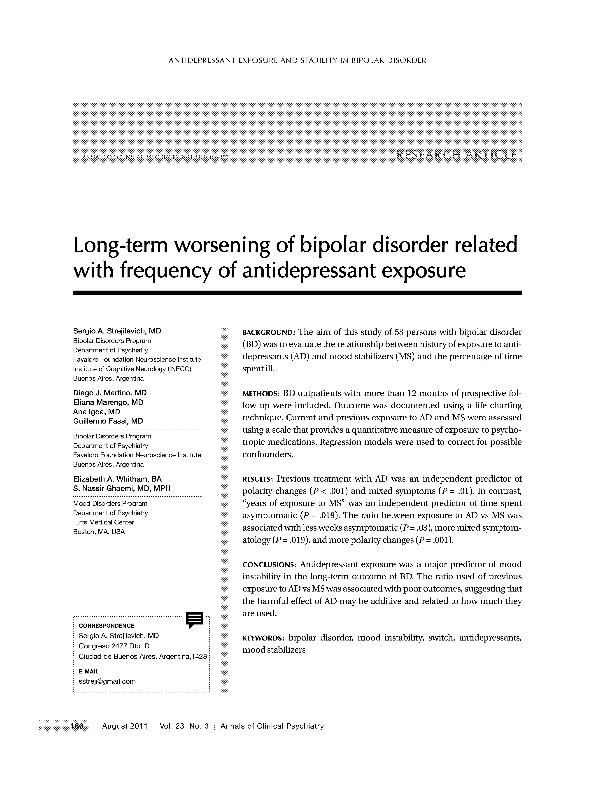Mostrar el registro sencillo del ítem
dc.contributor.author
Strejilevich, Sergio

dc.contributor.author
Martino, Diego Javier

dc.contributor.author
Marengo, Eliana

dc.contributor.author
Igoa, Ana

dc.contributor.author
Fassi, Guillermo
dc.contributor.author
Whitham, Elizabeth A.
dc.contributor.author
Ghaemi, S. Nassir
dc.date.available
2023-04-14T16:25:11Z
dc.date.issued
2011-08
dc.identifier.citation
Strejilevich, Sergio; Martino, Diego Javier; Marengo, Eliana; Igoa, Ana; Fassi, Guillermo; et al.; Long-term worsening of bipolar disorder related with frequency of antidepressant exposure; Informa Healthcare; Annals Of Clinical Psychiatry; 23; 3; 8-2011; 186-192
dc.identifier.issn
1040-1237
dc.identifier.uri
http://hdl.handle.net/11336/193916
dc.description.abstract
BACKGROUND: The aim of this study of 53 persons with bipolar disorder (BD) was to evaluate the relationship between history of exposure to antidepressants (AD) and mood stabilizers (MS) and the percentage of time spent ill. METHODS: BD outpatients with more than 12 months of prospective follow- up were included. Outcome was documented using a life charting technique. Current and previous exposure to AD and MS were assessed using a scale that provides a quantitative measure of exposure to psychotropic medications. Regression models were used to correct for possible confounders. RESULTS: Previous treatment with AD was an independent predictor of polarity changes (P < .001) and mixed symptoms (P = .01). In contrast, “years of exposure to MS” was an independent predictor of time spent asymptomatic (P = .019). The ratio between exposure to AD vs MS was associated with less weeks asymptomatic (P = .03), more mixed symptomatology (P = .019), and more polarity changes (P = .001). CONCLUSIONS: Antidepressant exposure was a major predictor of mood instability in the long-term outcome of BD. The ratio used of previous exposure to AD vs MS was associated with poor outcomes, suggesting that the harmful effect of AD may be additive and related to how much they are used.
dc.format
application/pdf
dc.language.iso
eng
dc.publisher
Informa Healthcare

dc.rights
info:eu-repo/semantics/openAccess
dc.rights.uri
https://creativecommons.org/licenses/by-nc-sa/2.5/ar/
dc.subject
BIPOLAR DISORDER
dc.subject
OUTCOME
dc.subject
ANTIDEPRESSANTS
dc.subject.classification
Psiquiatría

dc.subject.classification
Medicina Clínica

dc.subject.classification
CIENCIAS MÉDICAS Y DE LA SALUD

dc.title
Long-term worsening of bipolar disorder related with frequency of antidepressant exposure
dc.type
info:eu-repo/semantics/article
dc.type
info:ar-repo/semantics/artículo
dc.type
info:eu-repo/semantics/publishedVersion
dc.date.updated
2023-04-05T15:32:20Z
dc.journal.volume
23
dc.journal.number
3
dc.journal.pagination
186-192
dc.journal.pais
Estados Unidos

dc.journal.ciudad
Nueva York
dc.description.fil
Fil: Strejilevich, Sergio. Universidad Favaloro. Facultad de Medicina. Instituto de Neurociencias; Argentina
dc.description.fil
Fil: Martino, Diego Javier. Consejo Nacional de Investigaciones Científicas y Técnicas; Argentina. Universidad Favaloro. Facultad de Medicina. Instituto de Neurociencias; Argentina
dc.description.fil
Fil: Marengo, Eliana. Consejo Nacional de Investigaciones Científicas y Técnicas; Argentina. Universidad Favaloro. Facultad de Medicina. Instituto de Neurociencias; Argentina
dc.description.fil
Fil: Igoa, Ana. Universidad Favaloro. Facultad de Medicina. Instituto de Neurociencias; Argentina
dc.description.fil
Fil: Fassi, Guillermo. Universidad Favaloro. Facultad de Medicina. Instituto de Neurociencias; Argentina
dc.description.fil
Fil: Whitham, Elizabeth A.. Tufts Medical Center; Estados Unidos
dc.description.fil
Fil: Ghaemi, S. Nassir. Tufts Medical Center; Estados Unidos
dc.journal.title
Annals Of Clinical Psychiatry

Archivos asociados
